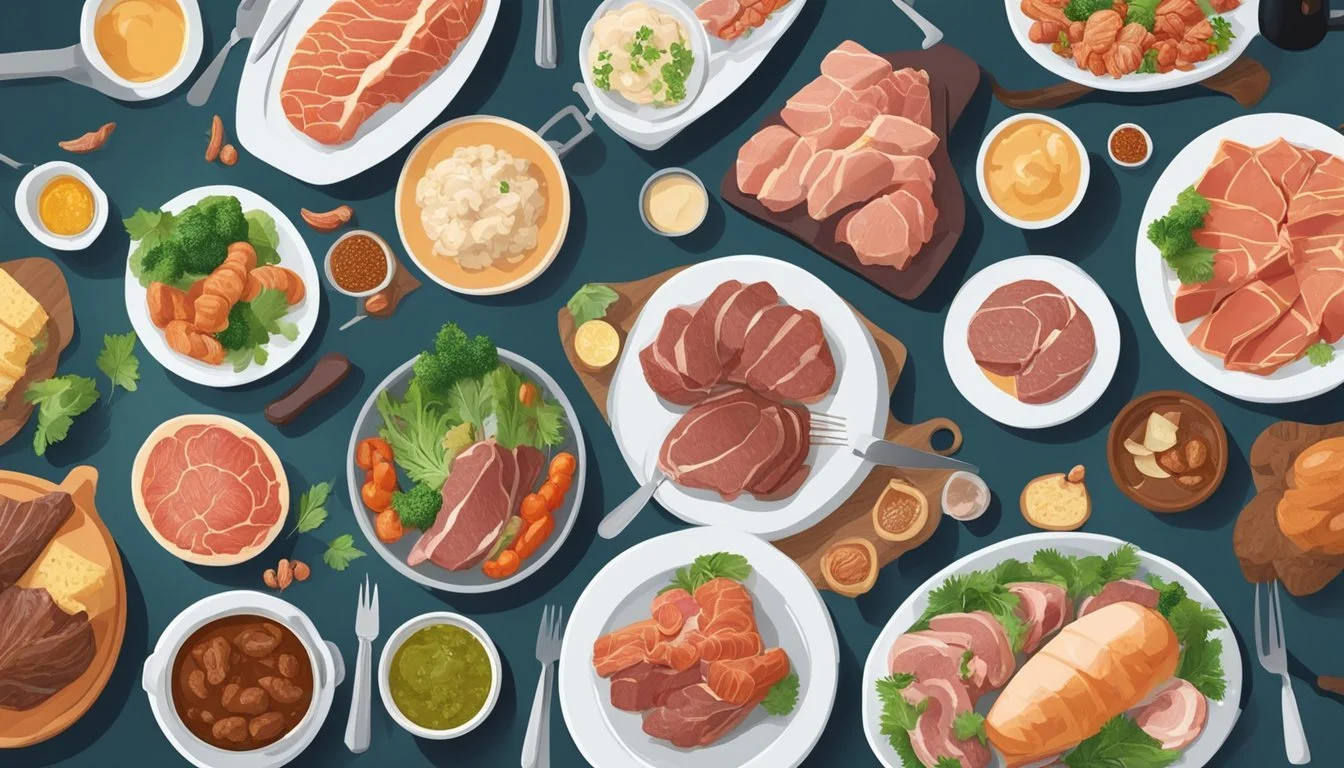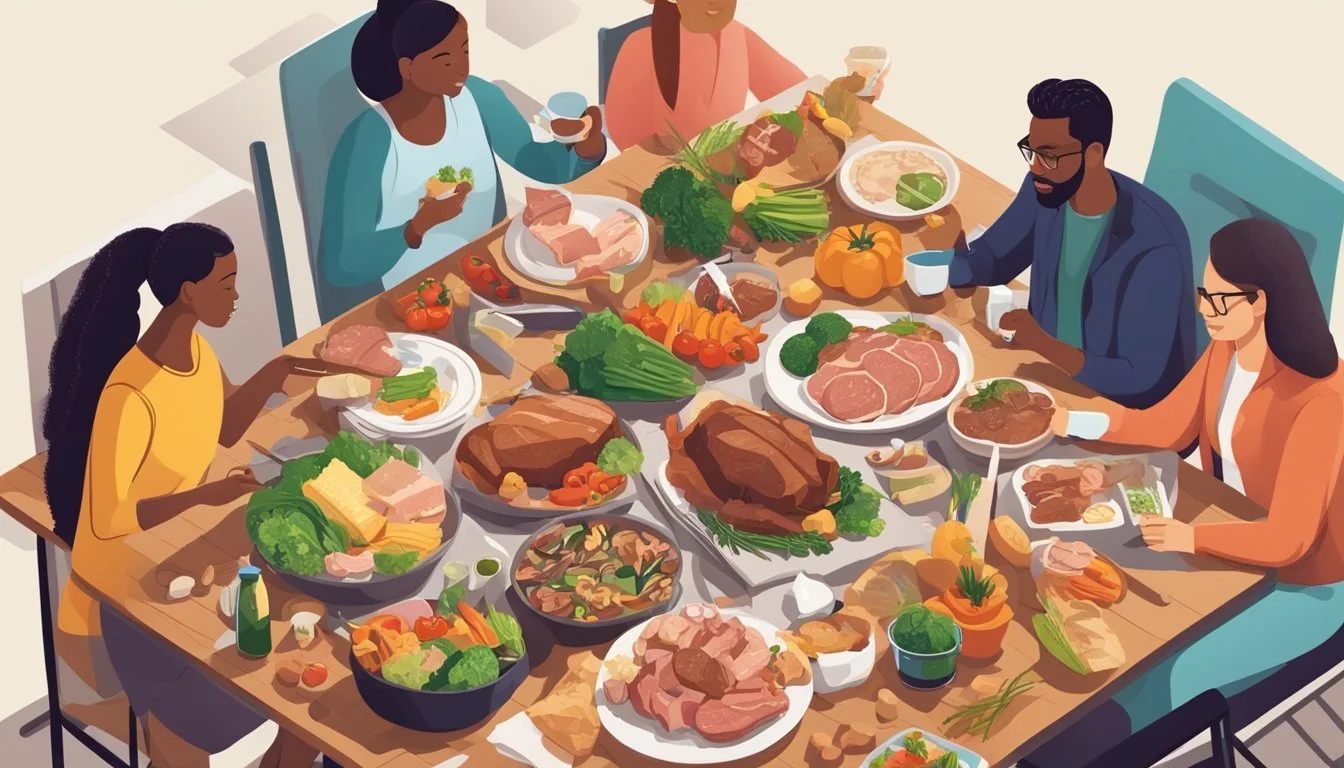How to Find Community Support While on the Carnivore Diet
Navigating Social Networks and Forums
Embarking on a carnivore diet can be a transformative journey, but it's one that doesn't have to be taken alone. The key to maintaining motivation and enjoying the process is often through community support—finding others who share your passion for a meat-centric lifestyle. As individuals adapt to this diet, which focuses exclusively on animal products and eliminates all other foods, they might seek the camaraderie and shared experience that only a community can offer. Such support can not only provide valuable tips and methods for sticking to the diet but can also be a source of encouragement during challenging times.
Online platforms have opened up avenues for carnivore diet adherents to connect with one another. From forums and social media groups to dedicated online meet-ups, there are numerous resources where like-minded individuals gather to discuss their experiences and progress. In these spaces, participants can exchange recipes, celebrate milestones, and receive advice on how to navigate social situations while maintaining dietary adherence. Additionally, many find that being part of a carnivore community helps them to remain accountable and inspired.
Beyond online interactions, local groups and global meet-ups offer in-person connections, bringing together those committed to the carnivore way of eating. Participating in group challenges, sharing success stories, and offering mutual support are just some of the ways individuals can engage. Whether virtual or face-to-face, these communities play a crucial role in helping members stay committed to their dietary choices, providing a sense of belonging and mutual understanding that can be pivotal to individual success.
Understanding the Carnivore Diet
The Carnivore Diet centers on consuming animal products exclusively and excludes plant-based foods. It prioritizes high intake of meat and fat while eliminating carbohydrates, aiming at weight loss and reduced inflammation among other health benefits.
Defining a Carnivore Diet
A Carnivore Diet is characterized by the exclusive consumption of animal products such as meat, fish, eggs, and dairy. It's a restrictive regimen that:
Eliminates all plant-based foods
Focuses on meat and animal fats as primary food sources
May include limited dairy, emphasizing zero-carb dairy products
Key Components of a Typical Carnivore Diet:
Meat
Examples: Beef, pork, lamb
Poultry
Examples: Chicken, turkey
Fish
Examples: Salmon, tuna
Eggs
Examples: Chicken, duck eggs
High-Fat Dairy
Examples: Butter, hard cheeses
Benefits and Challenges
Benefits:
Weight Loss: The diet's high protein and fat content can lead to satiety, reducing overall calorie intake.
Reduced Inflammation: Elimination of carbohydrate-rich foods, like grains and sugars, may decrease inflammation markers.
Simplicity: The food choices are straightforward, making meal planning less complex.
Challenges:
Nutritional Balance: Ensuring adequate intake of all necessary nutrients requires careful attention to the variety and quality of animal products consumed.
Social Dynamics: Adhering to the diet can be tricky in social settings, requiring strong community support.
Adaptation Period: Individuals may experience temporary side effects, like fatigue or flu-like symptoms, as they adjust to absence of carbohydrates and oxalates from their diet.
Starting Out on the Carnivore Diet
Embarking on the carnivore diet journey begins with a solid plan and understanding of the essentials to purchase. Careful planning and preparedness are paramount for a successful transition.
Creating Your Carnivore Diet Plan
One's journey should start with a detailed plan which specifies the intake of meats and animal products. The plan ought to prioritize high-fat foods, as fat will become the main energy source. Animal products range from beef, pork, chicken, fish, to organ meats—rich in nutrients and essential fats. Individuals may also consider whether to include dairy products, such as cheese and butter, based on their personal tolerance. It's important to tailor the plan to individual health goals, dietary needs, and preferences. Incorporating a variety of meats and cuts ensures a range of nutrients and prevents monotony.
Shopping for Carnivore Diet Essentials
When shopping for the carnivore diet, one should focus on quality sources of meat and animal products. Opt for grass-fed beef, free-range poultry, wild-caught fish, and pasture-raised eggs to maximize nutritional benefits.
List of Food Categories with Examples:
Red Meat
Examples: Beef, lamb, venison (What wine goes well with venison?)
Poultry
Examples: Chicken, turkey, duck
Fish & Seafood
Examples: Salmon, mackerel, shrimp
Organ Meats
Examples: Liver, heart, kidney
Dairy
Examples: Cheese, butter (if tolerated)
Fats
Examples: Tallow, lard, fatty cuts
Snacks can include small portions of high-fat dairy products or beef jerky for individuals requiring them. Planning for meals and snacks helps prevent impulse purchases that aren't aligned with the diet. Simple recipes focusing on meat with minimal seasoning can ease preparation and cooking.
Building a Supportive Environment
Adopting a carnivore diet often requires a solid support system to navigate the associated lifestyle changes. Identifying and engaging with supportive communities can significantly enhance one's success and motivation.
Finding Community Centers or Local Groups
For those on a carnivore diet, connecting with like-minded individuals locally can offer tangible, day-to-day support. Community centers and local groups often host events and meetups, where members can share experiences, recipes, and advice. These interactions can foster a sense of tribe and belonging, making dietary adherence easier.
Research local health and wellness centers for carnivore diet-focused groups.
Keep an eye on bulletin boards at local grocery stores, gyms, and clinics for meetup announcements.
Attend local health fairs and nutrition workshops to connect with potential support networks.
Online Communities and Forums
Online communities and forums provide a platform for individuals to join a broader carnivore conversation, offering support and camaraderie without geographical limits. Members benefit from the collective knowledge and motivation of a global support group.
Seek out carnivore diet forums and online groups on platforms like Facebook, Reddit, and dedicated carnivore websites.
Participate in discussions, ask questions, and share personal experiences to cultivate valuable relationships.
Join specialized subgroups, such as those focusing on women's health or managing specific health conditions, within these online communities.
Social media platforms are instrumental in connecting those following a carnivore diet. Hashtags and groups on these platforms help users find community events, share successes, and discuss strategies that work.
Navigating Social Dynamics
Adhering to a carnivore diet can significantly alter one's social interactions. Individuals on this diet often encounter challenges regarding social acceptance and temptation but can navigate these effectively with the right approach.
Handling Family and Friends
Understanding and Support: Individuals should communicate their dietary choices to family and friends clearly and confidently, emphasizing health reasons and personal benefits. A direct conversation can increase understanding, reduce judgmental responses, and foster a supportive environment.
Communicate Your Why: State your reasons for choosing the diet.
Example: "I feel healthier and more energetic on this diet."
Set Boundaries: Be clear about what you can and cannot eat.
Example: "I appreciate your cooking, but I must stick to my diet for health reasons."
Diet and Social Events
Preparation and Participation: Knowing how to prepare for social events where food is involved helps maintain dietary adherence without compromising social enjoyment.
Meal Preparation: Bring your own carnivore-friendly meal to gatherings.
Tip: Offer to share your food to introduce others to the diet.
Venue Selection: Suggest restaurants in advance that offer a variety of meat-based options.
Status: Likely to alleviate temptation and provide a comfortable atmosphere.
By actively engaging with family and friends about their dietary choices and approaching social events with preparation and adaptable strategies, individuals on a carnivore diet can navigate social dynamics effectively.
Enhancing Your Diet with Exercise
Incorporating exercise into a carnivore diet brings numerous benefits, including increased energy and overall wellness. A well-structured workout routine can bolster the success of this diet by capitalizing on the high-protein intake for muscle recovery and growth.
Workouts Complementary to the Carnivore Diet
Resistance Training: The high protein content of the carnivore diet aids in muscle repair. Individuals may find it beneficial to engage in strength training exercises such as weightlifting, which can be supported by their protein-centric nutrition.
High-Intensity Interval Training (HIIT): Short bursts of intense exercise followed by rest periods can increase metabolism and energy, which perfectly aligns with the energy derived from a meat-based diet.
Low-Impact Activities: For those seeking less intense options, low-impact exercises like walking, yoga, and swimming are beneficial for maintaining fitness without excessive strain.
Recovery and Managing Fatigue
Adequate Rest: Ensure sufficient sleep and rest days to allow the body to recover from workouts. The carnivore diet's focus on protein can assist in the muscle rebuilding process during these rest periods.
Hydration: Despite the absence of plant-based foods, it is vital to stay hydrated to support workout recovery and manage potential fatigue.
Listening to the Body: Detect early signs of fatigue and adjust exercise intensity as needed. The body's response to exercise on a carnivore diet is unique to each individual, making it essential to tailor workout and recovery practices accordingly.
Dealing with Specific Health Issues
Individuals on the carnivore diet often turn to it for potential benefits related to various health issues. This diet may influence inflammation and sleep patterns, impacting energy levels and overall wellness.
Addressing Inflammation through Diet
The carnivore diet eliminates plant-based foods, which proponents argue may reduce inflammation. Specifics to consider include:
Dietary choices: Consuming meat high in omega-3 fatty acids, such as fatty fish, could be beneficial in managing inflammation.
Individual response: Each person's response to dietary changes can vary; monitoring one's symptoms is crucial.
Effects on Sleep and Energy Levels
Alterations in diet can affect sleep quality and energy levels. Key points on the carnivore diet’s impact:
Sleep quality: Some individuals report deeper sleep after adjusting to the diet, while others may experience changes in sleep patterns.
Energy levels: An initial period of fatigue is possible, but many report a subsequent increase in energy levels. Monitoring one’s wellbeing is important for understanding these changes.
Learning from Others
Joining a community or seeking guidance can provide invaluable insights and motivation on one's carnivore diet journey. Sharing success stories and consulting with experienced coaches delivers direction and can solidify one's resolve.
Carnivore Diet Success Stories
Success stories serve as a powerful tool for those on the carnivore diet. They show real-life examples of how individuals navigated challenges and achieved their health goals. Sharing these narratives can offer both motivation and actionable strategies for others. Success stories often highlight:
Personal transformations: How the diet impacted health and wellness.
Overcoming obstacles: Strategies used to stick to the diet in various situations.
Meal variety: Inspirational meal ideas that comply with the carnivore diet.
Consulting with Nutrition Coaches
Nutrition coaches who specialize in the carnivore diet offer tailored advice and support. They help individuals understand the nuances of the diet, ensure nutritional needs are met, and provide guidance on how to approach social situations. Benefits of working with coaches include:
Individualized direction: Personalized diet plans and adjustments.
Expertise and experience: Coaches bring a wealth of knowledge.
Support system: A coach can become a pivotal part of one's support network.
Maintaining the Diet Long-Term
Long-term adherence to the carnivore diet hinges on ensuring consistent access to high-quality meat and incorporating variety through innovative recipes. These elements provide the nutritional foundation and culinary enjoyment necessary for sustaining this lifestyle choice.
Consistent Access to Quality Meat
Securing consistent access to quality meat is vital for those on the carnivore diet. They should prioritize sources that offer grass-fed, pasture-raised, and hormone-free meat. This ensures they receive the highest nutritional value from their meals.
Farmers' markets
Local butchers
Online meat delivery services
Additionally, purchasing meat in bulk and investing in adequate freezer storage can help maintain a steady supply while potentially saving money.
Innovating with Carnivore Diet Recipes
Innovation with recipes adds joy and variety, preventing dietary boredom. Individuals can explore different cooking methods such as grilling, smoking, or slow-cooking to enhance flavors and create satisfying meals.
Meat-based alternatives to traditional dishes (e.g., carnivore diet "pasta" using thinly sliced meat)
Homemade jerkies as convenient, portable snacks
By encouraging the sharing of recipes within supportive carnivore diet communities, they can enjoy a diverse range of meal options while adhering to their dietary choices.
Finding Answers to Common Questions
When embarking on a carnivore diet, individuals will likely encounter a plethora of questions that need to be addressed for a successful dietary transition. Properly researched answers help in enhancing understanding and reasoning behind this dietary practice.
Research Articles and Educational Resources
One should refer to research articles and educational resources to substantiate their knowledge base regarding the carnivore diet. The value of peer-reviewed articles cannot be overstated, as they provide insights grounded in scientific methodology. Relevant and accurate research articles can often be found in health and nutrition journals. Educational resources may also be available through reputable websites that specialize in nutritional information and offer comprehensive guides that can simplify complex content into more digestible formats. These resources are fundamental for one to develop a strong foundation of knowledge about the diet.
Articles: Look for publications in the fields of nutrition, dietetics, and health.
Online Resources: Official diet-specific websites, holistic health blogs, and practitioner sites can be trusted sources.
Engaging in Community Q&A Sessions
Engaging in community Q&A sessions can be remarkably beneficial for newcomers and seasoned carnivore diet followers alike. Many online communities, such as dedicated Facebook groups or forums, host real-time discussions where one can pose questions and share their experiences. Direct interaction with peers can often lead to rapid and relatable answers, providing immediate support and deepening one's understanding and practical knowledge of the carnivore diet.
Facebook Groups: Join these to ask questions and learn from the experiences of others.
Forums: Participate in discussions and reasoning to broaden your carnivore diet understanding.
Adjusting the Carnivore Diet for Individual Needs
For optimal health and satisfaction, individuals may need to tailor their carnivore diet to their unique physiology. This customization involves finding the right balance of macronutrients and selecting meats that suit one’s nutritional needs and preferences.
Personalizing Fat and Protein Ratios
The carnivore diet, primarily focusing on animal products, should be fine-tuned by adjusting the proportions of fat and protein to fit an individual's metabolic requirements. Fat is a key energy source on this diet, and may range from moderate to high intake levels depending on one's goals and response. For instance, someone looking to lose weight might adjust their intake towards a higher protein to fat ratio to potentially leverage protein's thermic effect.
Conversely, individuals aiming for enhanced endurance or mental clarity may increase their fat consumption for sustained energy. This balance should be monitored and adjusted regularly, as individual health responses can vary notably.
Considering Meat Variety and Preparation
Diversity in meat selection addresses diet variation and nutrition while preventing monotony. Choices extend beyond beef to include other ruminant meats like bison, elk, venison, goat, and lamb, which have differing micronutrient profiles. Non-ruminant options such as pork, fish, and poultry, as well as eggs and low-carb dairy products, can enhance a diet. It is important for a person to consider their food tolerances and preferences when making these choices.
Preparation methods also play a role in nutrition and personal taste. Some may prefer rare steaks, which can preserve certain nutrients, while others may opt for well-done preparations. Incorporating various cooking techniques like grilling, slow-roasting, or sous-vide can impact flavor and enjoyment, making diet adherence more attainable.
Exploring Membership and Subscription Options
When individuals commit to a carnivore diet, support is crucial for success. Memberships and subscription-based communities offer structured support, forums for discussion, and access to resources tailored for the carnivore lifestyle.
Advantages of Diet-Specific Subscriptions
Diet-specific subscriptions provide a plethora of benefits to members. These online communities connect individuals with shared dietary goals, facilitating a sense of camaraderie and shared purpose. Advantages of joining include:
Expert Guidance: Access to coaches and nutritionists specializing in the carnivore diet.
Community Support: An opportunity to engage with fellow members who are also following the same dietary regime.
Resource Access: Exclusive articles, meal plans, and research relevant to the carnivore lifestyle.
Flexibility: Many services offer the ability to cancel anytime, making it easy to opt-out if needs change.
Criteria for Selecting Support Services
One should be diligent when selecting the right subscription service. Here are some criteria to consider:
Coach Expertise: The qualifications of hosts and coaches within the community.
Member Testimonials: Positive experiences and reviews from current or past members.
Service Variety: Availability of daily, weekly, and monthly meetings covering a wide range of topics such as women's health, diabetes management, and more.
Forum Quality: Look for active and moderated forums with meaningful discussions.
Subscription Terms: Choose services that offer transparency regarding fees, as well as the freedom to cancel anytime without penalties.
Connecting Through Media and Events
Finding community support while on the Carnivore Diet involves utilizing various platforms to connect with like-minded individuals. One can leverage social media for daily motivation and direction or attend specialized meetups and conferences for in-depth knowledge sharing and personal connections.
Leveraging Instagram and Social Media
Individuals on the Carnivore Diet can find an abundance of support and direction through Instagram and other social media platforms. By following Carnivore Diet-focused accounts, one can gain daily inspiration and practical advice. Key actions include:
Follow relevant accounts: Look for users who share meal ideas, success stories, and provide moral support.
Utilize hashtags: Searching for hashtags like #CarnivoreDiet or #MeatBasedDiet can lead to discovering a broader community.
Engage actively: Commenting, sharing, and messaging other carnivore dieters enhances the community feeling and can provide direct motivation.
Attending Carnivore Diet Meetups and Conferences
Meetups and conferences offer more personal forms of support for those on the Carnivore Diet. They can attend these gatherings to meet peers and experts in the field. Key benefits of meetups and conferences include:
Networking: They provide opportunities to form friendships and professional contacts within the Carnivore Diet community.
Learning: Conferences often feature speakers with expert insights that can deepen one's understanding of the diet's principles and benefits.
To find local meetups and forthcoming conferences, one can often find information shared on social media platforms or dedicated Carnivore Diet websites and forums.
The Role of Mindset and Psychological Well-being
Adopting the carnivore diet often requires a significant shift in one's eating habits, which can in turn impact psychological well-being. Success on this diet hinges on maintaining a resilient mindset, developing confidence, and finding intrinsic motivation to adhere to the dietary choices.
Developing Confidence on the Carnivore Diet
Individuals transitioning to a carnivore diet might initially struggle with confidence, given the diet's departure from conventional nutritional guidelines. Confidence builds as individuals educate themselves about the carnivore lifestyle and, more importantly, witness personal health improvements. It's essential to:
Gather accurate information from reputable sources to construct a solid foundation for the diet.
Start small by introducing changes gradually to avoid becoming overwhelmed.
Connect with experienced carnivore diet followers, which can bolster confidence through shared experiences and support.
Confidence is also nurtured by setting attainable goals and celebrating small victories along the dietary journey.
Finding Joy and Motivation in the Diet
Joy and motivation are vital for sustaining any diet, including the carnivore diet:
Keep a journal of your carnivore diet journey to track progress, health benefits, and moments of joy.
Incorporate variety within the diet's constraints, experimenting with different cuts of meat and preparation methods to keep meals interesting.
By recognizing each meal as an opportunity to nourish the body in line with personal wellness goals, individuals can find joy and robust motivation in their dietary practice. It's not merely about adhering to a diet but embracing it as a fulfilling lifestyle change.











